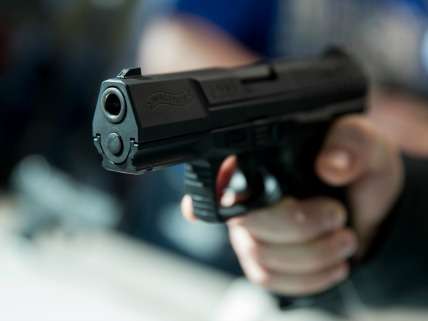Gun-Owning Expert on Logical Fallacies Deploys Them Against Gun Ownership
Psychologist Daniel Levitin describes his decision to keep firearms for self-defense as emotionally satisfying but irrational.

Daniel Levitin, a psychology professor at McGill University, is the author of Weaponized Lies: How to Think Critically in the Post-Truth Era, which according to The Wall Street Journal "lays out the many ways in which each of us can be fooled and misled by numbers and logic." Levitin illustrates a couple of those ways in a recent New York Times op-ed piece about his decision to keep guns at home for self-defense, which he portrays as emotionally satisfying but logically deficient.
Levitin want his audience to know he is not a right-wing gun nut. "I am comfortable with guns," he writes. "I grew up shooting targets for sport and took part in marksmanship competitions. I have also voted for Democrats in most elections, strongly support gun control and am against the death penalty. I do not think the drafters of the second amendment envisioned concealed semiautomatic weapons and hollow-point bullets in everyone's hands." But they did envision that Americans would have a right to armed self-defense, a right that Levitin seems to denigrate even as he exercises it.
"Rationally," Levitin writes, "I know I may even be worse off with a gun. A study by epidemiologists at the Centers for Disease Control and Prevention found that having a firearm in the home almost doubles the risk of a violent death there. Another study, by the Violence Policy Center, found that in 2012 there were 259 justifiable gun homicides (that is, people turning the tables on an aggressor), but more than twice as many unintentional fatal shootings."
The CDC study cited by Levitin, which was published in 2004, found that "persons with guns in the home" were twice as likely as people living in gun-free residences to die "from a homicide in the home." Contrary to what Levitin says, that does not mean "having a firearm in the home almost doubles the risk of a violent death there," because correlation does not prove causation. It could be that owning a gun increases the risk of being killed, but it also could be that other factors increase the risk of being killed as well as the likelihood of owning guns. If people who anticipate violent confrontations, such as residents of high-crime neighborhoods or women with angry ex-husbands, are especially likely to arm themselves, for example, that tendency could partly or completely explain the association found in this study.
The other source cited by Levitin, a 2015 report from the Violence Policy Center, compared the number of justifiable gun homicides in 2012 (259) to the number of fatal unintentional shootings (548), the number of criminal gun homicides (8,342), and the number of gun suicides (20,666). But these are not the relevant numbers for someone trying to figure of whether it's a good idea to keep a gun for self-defense. The number of times firearms are used for self-defense each year is a matter of considerable dispute, with estimates ranging from less than 100,000 to more than 2.5 million. But survey data indicate that defensive use rarely involves firing a gun, let alone injuring or killing anyone. Justifiable gun homicides therefore represent a tiny fraction of the defensive benefit from gun ownership.
The fact that brandishing a gun is typically enough to ward off an attacker is also relevant to Levitin's other major reservation about keeping firearms for self-defense. He describes an incident in which he "retrieved a gun and loaded it" in response to a "sketchy-looking stranger in my backyard" who seemed to be casing his house for a burglary. After calling the police, Levitin decided to leave his home rather than confront the intruder. "There is nothing in my home worth a man's life," he writes. "They are just material possessions. I can defend my life if called upon, or the lives of my family, but I don't need to defend my stuff by shooting someone. That's just crazy."
That is one way of looking at it, and Levitin has a right to retreat if he thinks that is the best course of action. But the research on defensive gun uses suggests the likelihood that he would have had to fire his gun was quite small, and one could argue that a burglar who is undeterred by a visibly armed homeowner poses a general threat to public safety that is worth confronting rather than evading. Either way, Levitin should not have to apologize for the choices he makes regarding the defense of himself, his home, and his family, and neither should anyone else.


Show Comments (155)